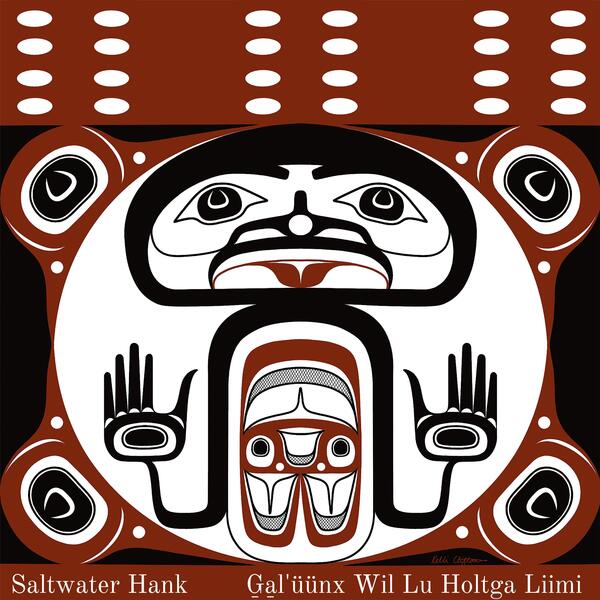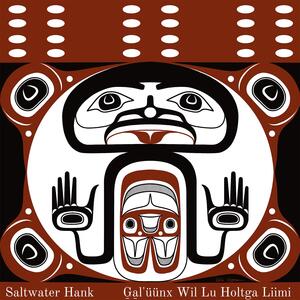Information/Write-up
This is something considerably different. Coming out of Canada it qualifies as Americana, once you get passed some of the strange words. I’m not going to go into details about the language, its origins & Saltwater Hank’s push-back against 2-centuries of cultural eradication by the Canadian government. Due to lack of space, I’ll focus on the music.
The songs are performed in the Ts’msyen tradition — an Indigenous language in the British Columbia area. Saltwater Hank (aka Jeremy Pahl) is a member of the Ts’msyen nation. Despite this “foreign” approach, the music is interesting to hear. It proves music is indeed a universal language. It may be a deep dive for some but no stranger than listening to Aboriginal music, or any foreign music from Africa, Europe, Russia, China, Brazil, or Scandinavia.
The 9-cut Gal’uunx wil lu Holtga Liimi (Dropped July 1–Independent) was recorded in collaboration with Danny Bell, Liam Meivor & Saltwater Hank in BC. Listening is all that’s required to appreciate it. It’s World Music & for decades we’ve been embracing such explorations into morsels of alternative melodies, beats & songwriting. On first listen what’s different are the topics. Musically, Hank’s vocals do have a Richard Thompson tint as if he were singing in Celtic, as well as that twisted lead guitar style Thompson made famous.
The band does perform many songs (original & traditional) in a modern manner acclimated to their own culture. It seems the issues these people face are similar to the ones in America. There is a commonality to their voice. The music is country-flavored & makes the songs easier on the average American ear. Patience for interpretation is required but in America, even Italians have had hits in Italian (“Volare,” “Time To Say Goodbye”), the Spanish have had hits in Spanish (Oye Como Va,” “La Bamba,” “Macarena”) the French (“Dominique” & “Love Is Blue”) & Germans (“Danke Schoen” & “Mack the Knife”).
While I didn’t understand the lyrics (“Ba’wis”) the instrumentation & groove laid down is what’s compelling. For a funny reason. It sounds like it’s being sung in English but mumbled like so many rock singers do. I find it accessible. Ears will “translate” the words. The vocals soar & the delivery has lift. The guitars & lap steel are good. Some songs have English words so it’s not entirely elusive. Lots of good music here.
First Nations Ts'msyen songwriter Saltwater Hank has shared the rollicking "'Nii Wila Waalt," the latest single from his upcoming full-length G̱al'üünx wil lu Holtga Liimi, which is arriving July 1.
Written entirely in the Ts'msyen language Sm'algyax and inspired by Hank's longstanding love of roots and country music, G̱al'üünx wil lu Holtga Liimi was created as a document of resistance against North America's genocidal machine, a push against our various governments' efforts to eradicate Native culture and language.
"'Nii Wila Waalt" was inspired by Hank's research into Indigenous practices for harvesting seaweed, which stated that the seaweed must be harvested before cedar bark is stripped, as stripping the cedar brings rain — he later learned that this piece of traditional knowledge is a scientifically accurate practice:
This is a series of natural events that indicate when we are supposed to harvest things. These protocols have been passed down since time immemorial, and are really indicative of how the gregorian calendar just does not make sense to us.
We go after salmonberries when the ripening bird sings, and that's that. We only harvest in good weather, because the weather is a very powerful thing that is meant to be respected. We always harvest our seaweed first because we have to dry it right away. If we strip cedar bark, the old people say it will rain, and we can't dry our seaweed outside if it's raining. If we strip the cedar bark too early it will also hurt the tree.
-Kaelen Bell, Jun 01, 2023
Saltwater Hank: vocals, guitar, fiddle (Track 8)
Danny Bell: drums
Liam Mcivor: steel guitar
Chloe Nakahara: fiddle (Tracks 6 and 7)
Mixed by Corwin Fox
Recorded by Danny Bell, Liam Mcivor and Saltwater Hank in Kxeen in a big Ts'msyen cedar longhouse.
Cover Art by Adziksm Gyipaayk (Kelli Clifton)


No Comments